Legacy Stories
Corey Kerr
Gunnery Sergeant Corey Kerr was a natural leader and protector who brought out the best in his fellow Marines. He survived two combat tours in Iraq and one in Afghanistan throughout the course of his career. Several years after his final infantry tour, Kerr struggled with depression, anxiety, and extreme irritability. He died by suicide June 11, 2022 at 37 years old. Corey resided in North Carolina with his wife MaryAnne and their two children. MaryAnne shares his Legacy Story to help break the mental health stigma in military culture and as a call for the Department of Defense to expand efforts in tracking and treating traumatic brain injuries among active service members and veterans.
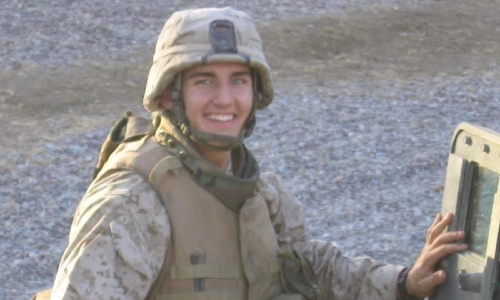
Warning: This story contains mentions of suicide and may be triggering to some readers.
By Dan Molloy
Gunnery Sergeant Corey Kerr took extraordinary pride in being a United States Marine. He demanded excellence from himself and others, and by recognizing the true potential of the younger Marines he trained, Kerr brought out their best. His legacy, his widow MaryAnne says, will be that of a protector, whose own postwar experience can and must lead to changes in the ways veterans interact with mental health services back at home.
Kerr felt the call to serve as a high school junior in Corry, a small town in northwestern Pennsylvania. The nation’s response to the 9/11 attacks inspired him to enlist in the Marine Corps because he knew something had to be done. By the time he was 21, Kerr had served two combat tours in Iraq with the 2nd Battalion, 7th Marines.
After returning from Iraq to Southern California’s Camp Pendleton, Kerr met MaryAnne in 2007, and the two fell for each other almost immediately. MaryAnne, studying to become a registered nurse at that time, had never dated an infantryman. She realized quickly that Corey would not be especially forthcoming about his experiences overseas.

“I never knew how to be around someone that had seen combat,” MaryAnne said. “I would be willing to listen, but he didn’t want to talk about it.”
While details were often sparse, MaryAnne knew her husband had experienced great loss in Iraq. On Dec. 1, 2005, 10 of Kerr’s fellow Marines were killed and 11 others injured when a pressure plate bomb exploded in an abandoned factory near Fallujah. Kerr did not share many details about that tragic day, but MaryAnne said her husband moved forward with a sense of survivor’s guilt.
Corey’s third combat deployment would be his first time overseas as a husband and a father. This tour took him to Afghanistan in 2010 with the 3rd Battalion, 5th Marines. He was assigned to the battalion commander’s security detail during the Battle of Sangin, where US forces clashed with the Taliban in a grueling campaign. The Marines of 3/5 endured hundreds of firefights and took heavy losses due to countless blasts from improvised explosive devices (IEDs). By the end of their tour in April 2011, the 3/5 had lost 25 Marines, making Sangin the bloodiest battle for American forces in Afghanistan.
Gunnery Sgt. Kerr took on recruiting duties for the Marine Corps back home in North Carolina in 2018 - 2020, where he and MaryAnne now had two school-aged children. MaryAnne recalls how Corey always had a bit of a temper, but the stress of his job seemed to exacerbate his anger. A few times, she suggested he find someone to talk to about his stress and trouble sleeping and whether it may be related to his combat experience, but Corey continued to push back.
“We were together for 15 years, and I had never seen the man cry,” MaryAnne said. “This man — who has seen so much trauma and has experienced so much loss — was so strong, and I thought, ‘How is he not crying?’”
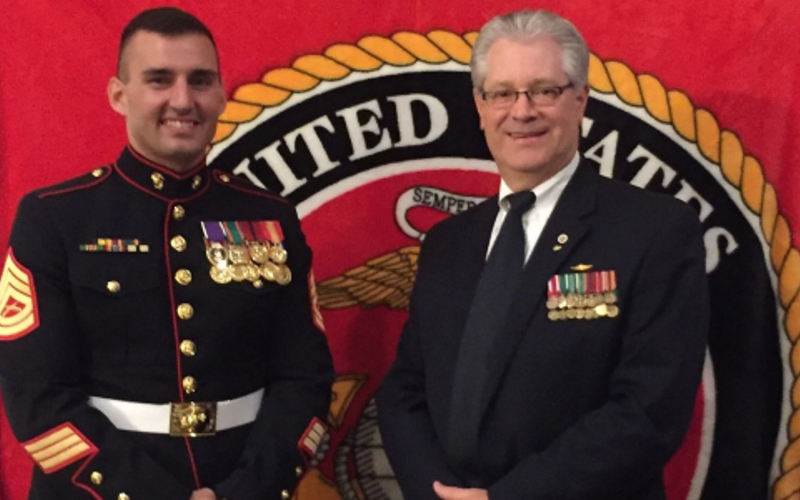
Corey’s mother Brenda believes her son’s emotional restraint stemmed from his stepfather telling him men should never cry or show their feelings. This attitude, she says, was further instilled by military culture, which places the collective needs over those of the individual.
MaryAnne said the fuse on her husband’s temper seemed to get shorter and shorter, and she did not know what to do. He was drinking more and becoming very combative with his family. Corey scolded MaryAnne when he found out she asked his friends to encourage him to consider speaking with a therapist. Corey was now in his mid-30s, and MaryAnne tried whatever she could to help him realize his behavior had changed.
“This was not normal for Corey,” she said. “The person that I met at the very beginning was the man I married and fell in love with. Towards the end of his life, he was somebody I didn’t even know anymore. I was fearful of him.”
Corey visited a psychologist in December 2020, explaining his struggles with depression, anxiety, and post-traumatic stress. According to intake notes MaryAnne obtained, he mentioned how these issues were causing problems in his marriage and other relationships. He had his first appointment early 2021 but stopped going until a year later. He had a total of six mental health visits.
Still struggling at home, Kerr returned to the same mental health clinic in January 2022, following the advice from his primary care manger after discovering Corey had stopped going. This time, according to MaryAnne, his psychologist focused almost exclusively on his marital troubles and less on his military experience and repeated exposure to bomb blasts in the Middle East. MaryAnne said he was never referred to a specialist for further evaluation of TBI after Corey stated he was exposed to multiple IED blasts.
“I wish they had done more than they did,” MaryAnne said. “I don’t feel like he got the care that he needed.”
Gunnery Sgt. Corey Kerr died by suicide June 11, 2022. He was 37.
At 3 a.m., just hours after her son’s death, Brenda was scouring the internet seeking any explanation for her son’s tragic spiral. She learned about Project Enlist and decided with MaryAnne to donate Corey’s brain for scientific study.
“We were so desperate for answers, just something to show that there was something wrong with Corey,” MaryAnne said. “He didn’t just wake up one day and decide to be this completely different person that we never imagined him being and he never wanted to be.”
Researchers at the UNITE Brain Bank concluded while Kerr did not have CTE, his brain did show evidence of a history of traumatic brain injury (TBI). MaryAnne says while this provided some sense of understanding, her work was just beginning.
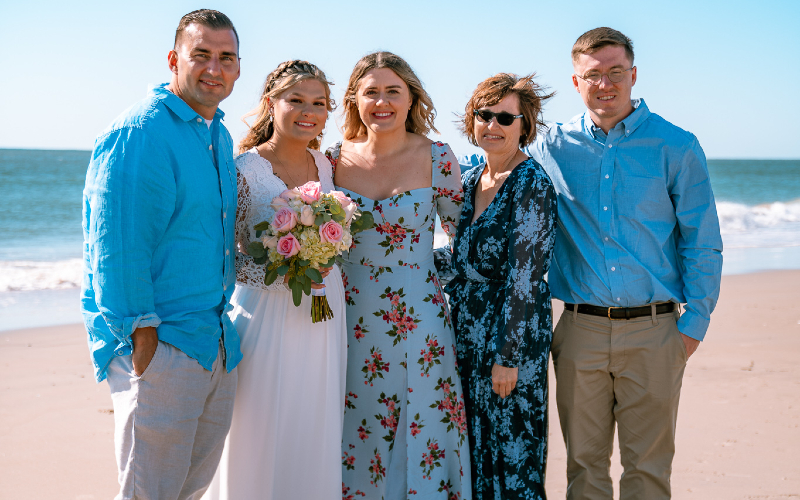
“I’m sure there are so many Marines having these emotions, and they don’t even know what they’re going through,” she said. “How can this loving, charismatic man turn into this completely different person?”
MaryAnne hopes her family’s frustration with Corey’s experience seeking mental health services is not in vain. By its own admission, the Department of Defense has inadequately identified, tracked, and treated traumatic brain injury among service members. Corey’s experience, MaryAnne says, illustrates the necessity for better veteran mental health care and TBI treatments.
In addition to her push for systemic changes, MaryAnne hopes Corey’s story helps break down the mental health stigma grounded in military culture. She hopes anyone struggling with symptoms like Corey’s recognizes they are not alone, and help is available.
“Seeking help doesn’t make you weak,” she said. “If anything, it makes you look stronger, because you are not only looking out for yourself, but you’re doing it for your family.”
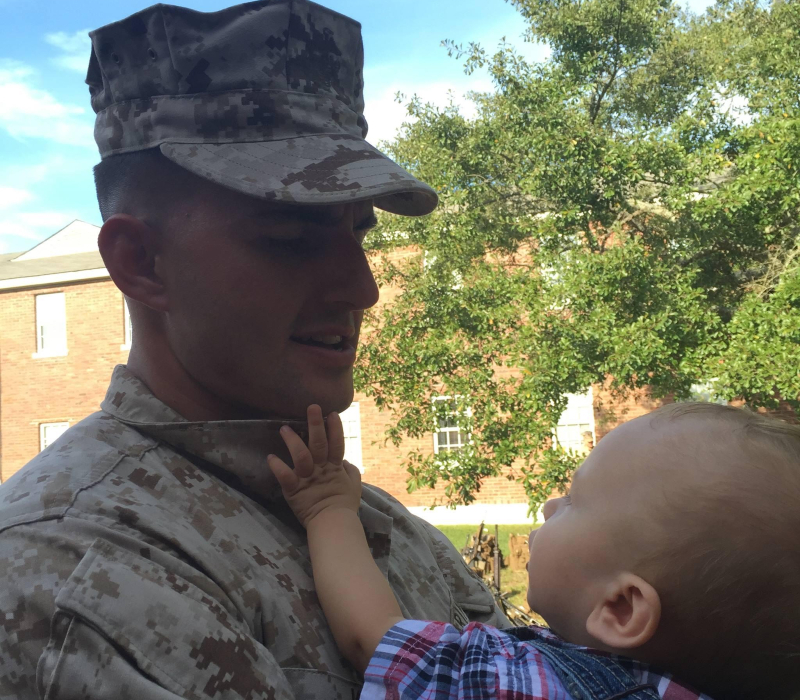
Corey Kerr put his life on the line for his country and for his fellow Marines. MaryAnne Kerr believes his story will continue to inspire brave men and women in uniform.
“He loved the Marine Corps and the people he served with in that brotherhood,” she said. “He would have wanted his brothers to know what went on with him, because this could help them.”

You May Also Like
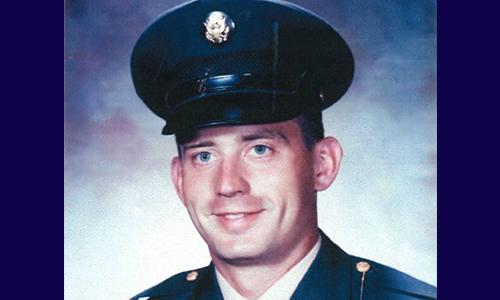
Vietnam veteran Allen Way suffered from PTSD and TBI symptoms before researchers diagnosed him with CTE after death. Learn about his struggle, and beautiful life of service in his Legacy Story as told by his widow.
Read Allen Way's Legacy Story
When he returned home from the war, Keith Pinkham struggled with the demons that afflict many soldiers. A devoted husband for 32 years, he died at just 65. Keith's wife donated his brain to the UNITE Brain Bank.
Read Keith Pinkham's Legacy Story